DIY App Makers: Why You Should Not Use Them?
Diy app makers are popular because the market for mobile applications is constantly increasing, as a result of which all small and big business wants to make use of the benefits of mobile applications. There are plenty of ways to create your own application (such as DIY app makers), no matter what your business is. Many entrepreneurs and business owners are in the dilemma of hiring agencies for mobile application development or choice of marker DIY application. However, it is always better to keep a traditional approach to mobile application development, rather than using application developers DIY.
The digital landscape is brimming with potential currently due to the phenomenal rise in demand for mobile apps. Many mobile app owners are now raking in millions of dollars in revenue.
Thus, making this industry incredibly lucrative. According to Statista, mobile app revenue is going to hit nearly $582 Billion in 2021.
The mobile apps are performing well in the market. However, DIY app makers are struggling to keep up with the kind of technological development.
Problems that DIY apps face today:
Python is adaptable and utilized in many industries and applications. Let’s examine some of the Python uses:
- Lack of robust security protocols
- Apple’s guidelines are limiting DIY app submissions
- There is a limit on how you can customize on the basis of Template.
DIY app makers don’t exhibit their security protocols, which means it’s harder to trust them, especially if your app needs to store sensitive information such as credit card numbers of your customers. Moreover, when you customize with templates it offers room for branding in comparison to custom mobile apps which are incredibly lagging in other aspects.
This becomes a major roadblock towards executing the app in such a way that it aligns with your vision.
Having said that, if you’re still looking to make a DIY app using an app builder, here are some DIY app builders that are highly trustworthy and offer commendable features that you can use to get your app up and running.
Top DIY App Makers (Alternatives) You Can Opt For If You Want To Make It Yourself
1. Swiftic
Swiftic is one of the biggest DIY app development platforms in the market, powering more than a million mobile apps.
Founded in 2010, Switfic comes with six different app navigation styles and seven unique app design templates.
What makes Swiftic stand-out is the customization it provides in the app design to inculcate your company’s branding within the design work.
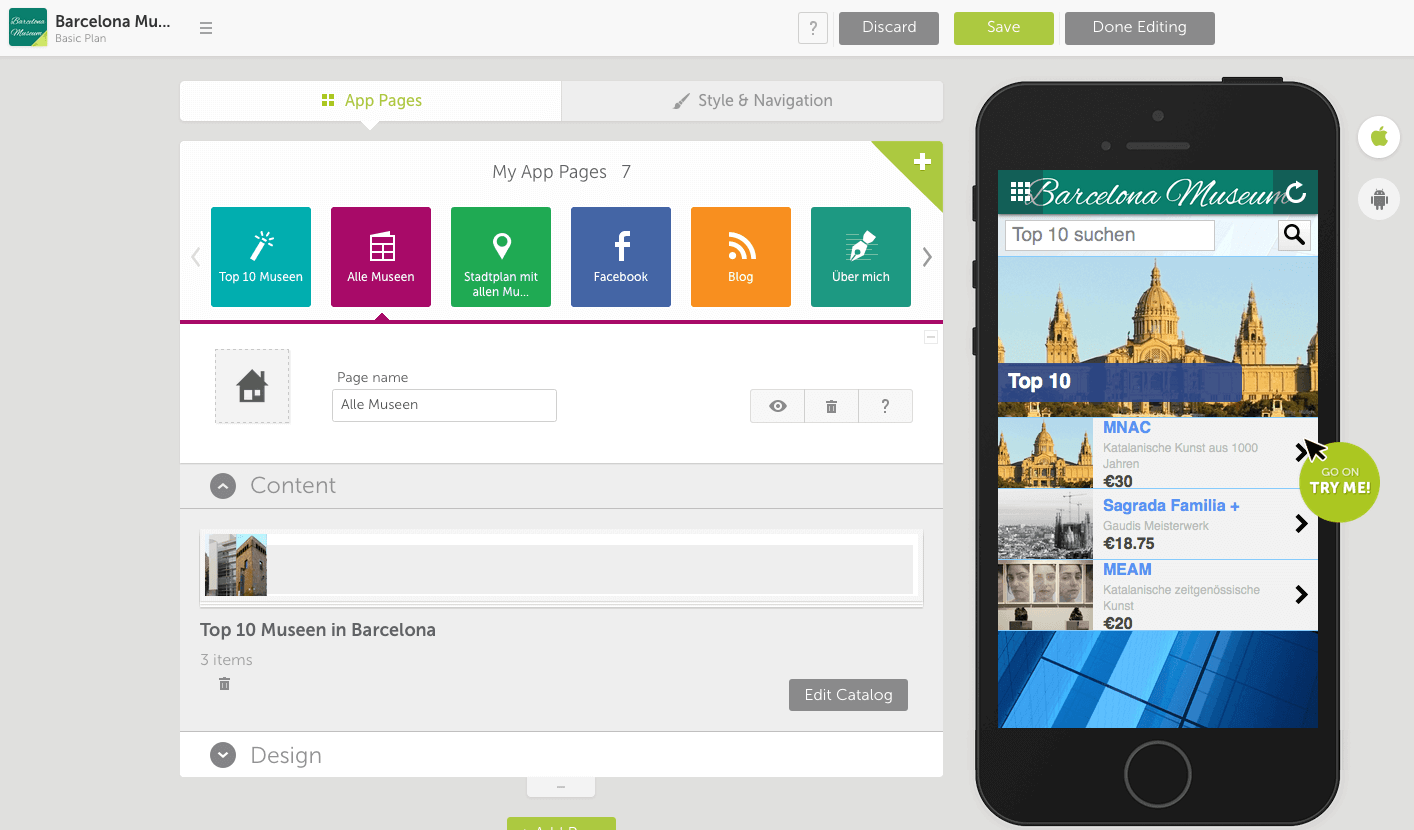
- The platform offers a wide variety of features for business owners such as Scheduling, e-commerce setup, and review sections, making your platform all about consumer engagement.
- For businesses that are consumer-facing, Swiftic is a great DIY App maker.
- Also, their pricing is quite affordable, which is $57 monthly, $48 yearly, and $41 bi-yearly plans.
2. Appy Pie
Appy is a fast-growing app builder that is based on a drag and drop UI, designed for people with no knowledge of coding.
In its application, Appy Pie is a great platform to create mobile apps that are more content-heavy.
For small-sized businesses and startups, apps made on Appy can be a great way to penetrate the consumer market of their industry.
Their price plans are incredibly pocket-friendly, with their basic plan costing $9.99 /month, professional plan costing $29, Business plan costing $79, and enterprise plan costing $199.
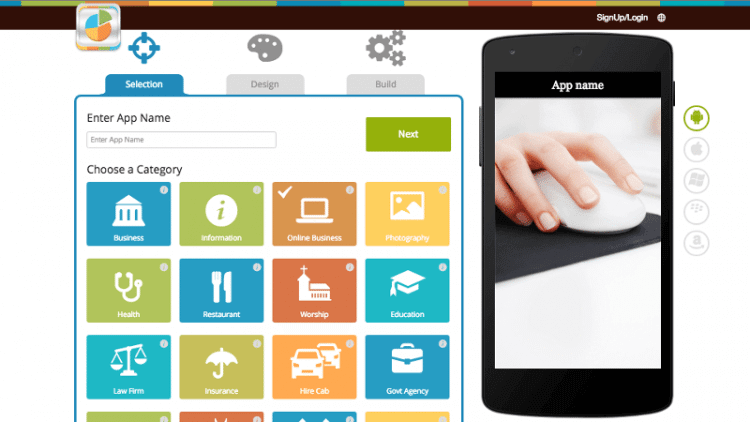
- Appy’s features allow app makers to upload PDFs/e-books, create databases, and penetrate social platforms through their social media connection feature
- Appy Pie’s unique selling point is its revenue model, which allows you to build apps free of cost and then transition to a paid model to deploy your mobile app on Google Play store
3. BuildFire
BuildFire is one of the most recognized platforms to create a business application, mostly serving companies and brands at an enterprise level.
For people creating their mobile apps on BuildFire, one advantage that they get over other platforms is the ability to release updates frequently and testing those updates on the fly.
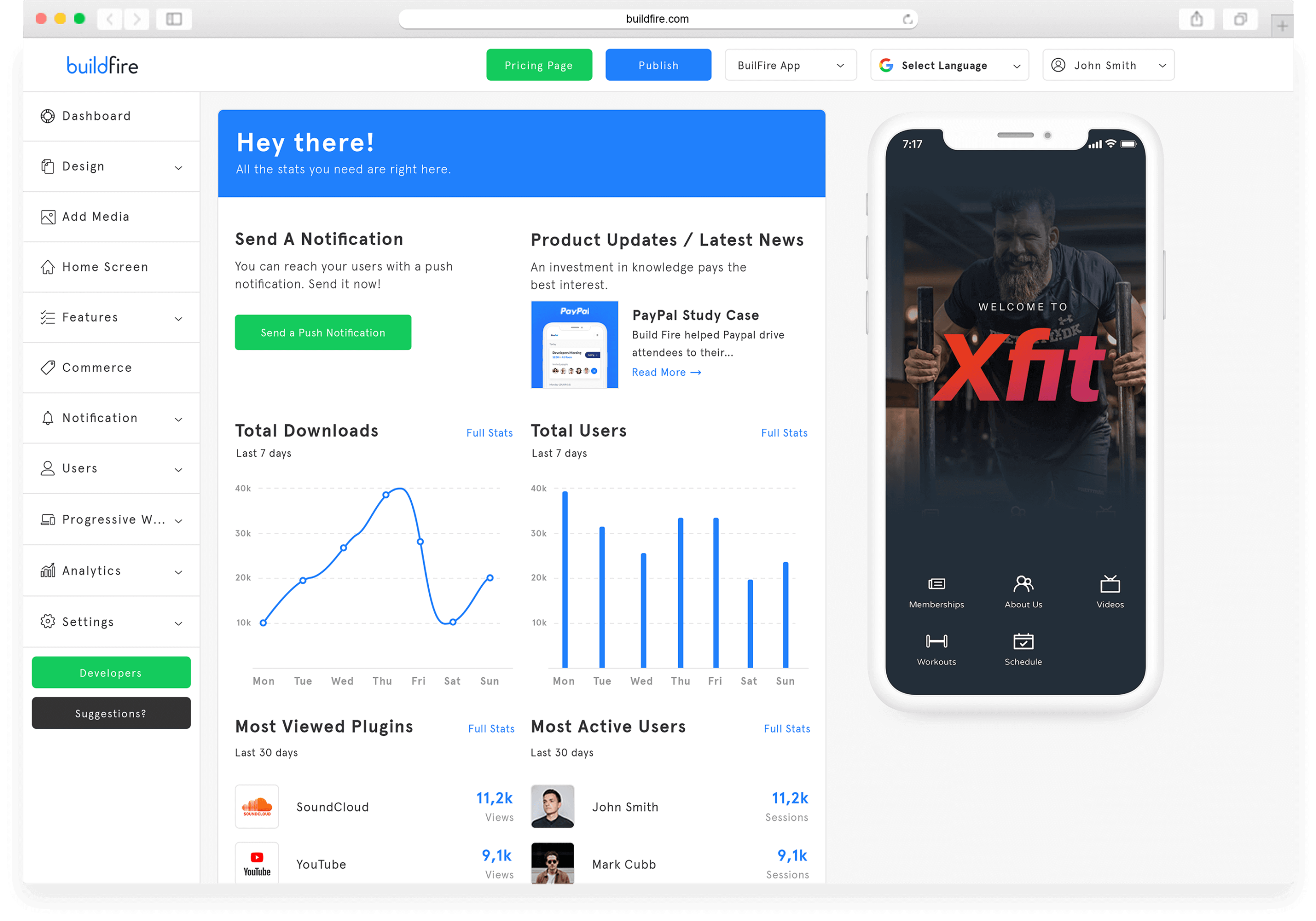
- The app allows for massive customization and configuration from a functional and design perspective, making it a go-to option for businesses
- BuildFire’s premium plan does not drill a hole in your pocket, which makes it even better with only $49/month
- So if you’re looking for a DIY platform that is easy to use and allows in-depth customization, then BuildFire can be an excellent option to create your own business app
4. AppInstitute
Based in the UK, AppInstitute is an excellent platform that allows for Android app development, iOS app development, and Progressive Web App development.
AppInstitute allows mobile apps to have access to its very own payment merchant, allowing users to make in-app payments – which makes the platform much secure than other options.
Users are charged $49/month for Android apps and Progressive Web apps, while iOS apps cost around $81/month.
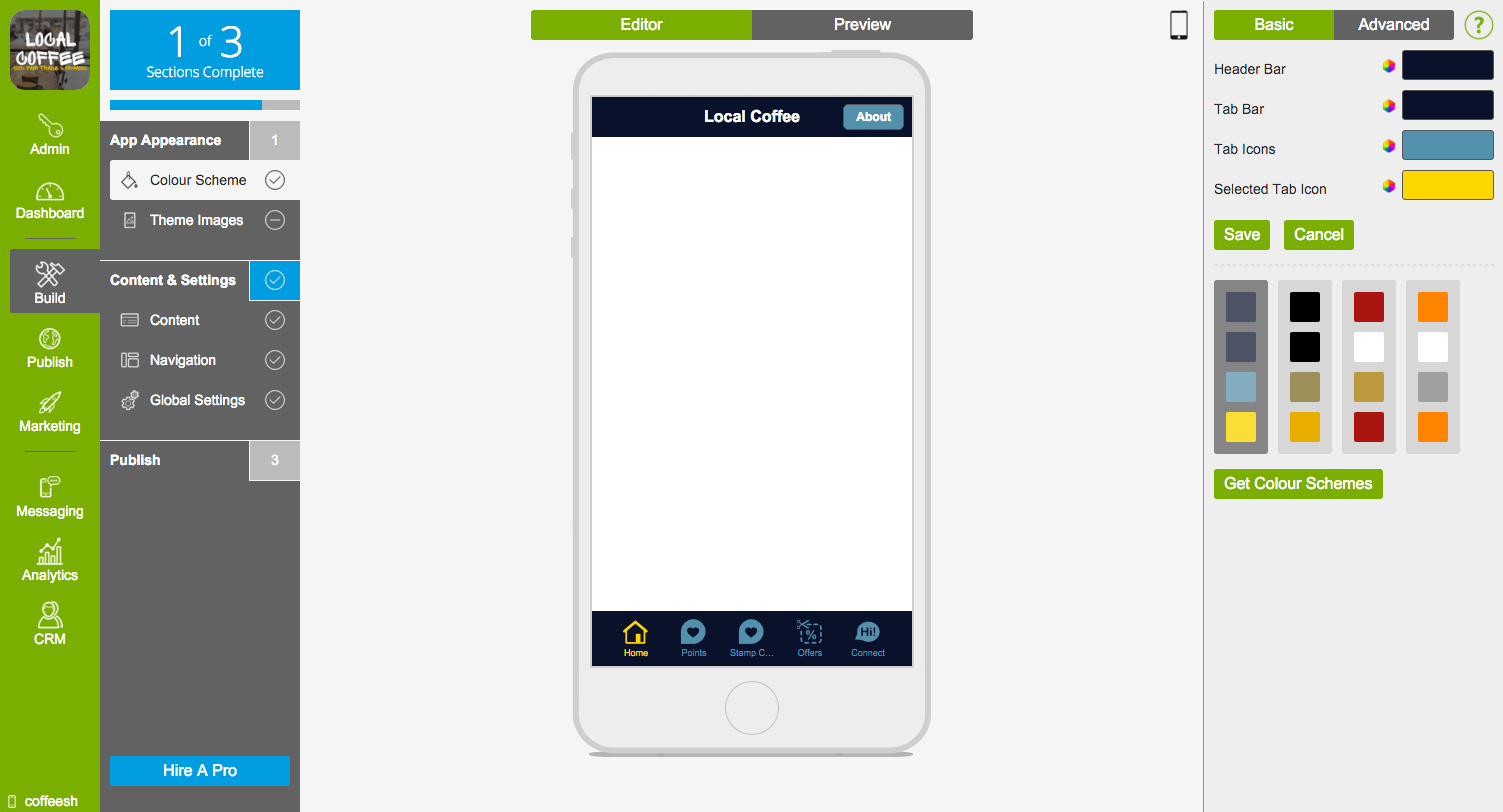
- AppInstitute’s price is reasonable in comparison to what it offers
- Similar to other DIY platforms, from a design perspective, there is enough room for customization to bring out your brand voice through the app, while providing great functionality for appointments, loyalty programs, and event management
- As the app maker, you get access to the app’s analytics while having the option to integrate push notifications that can help your business generate more user-engagement on the platform
5. GoodBarber
GoodBarber is a France-based app building platform that is widely considered as one of the most tech-supportive platforms for apps. Some unique features that GoodBarber offers include Geofencing and iBeacons
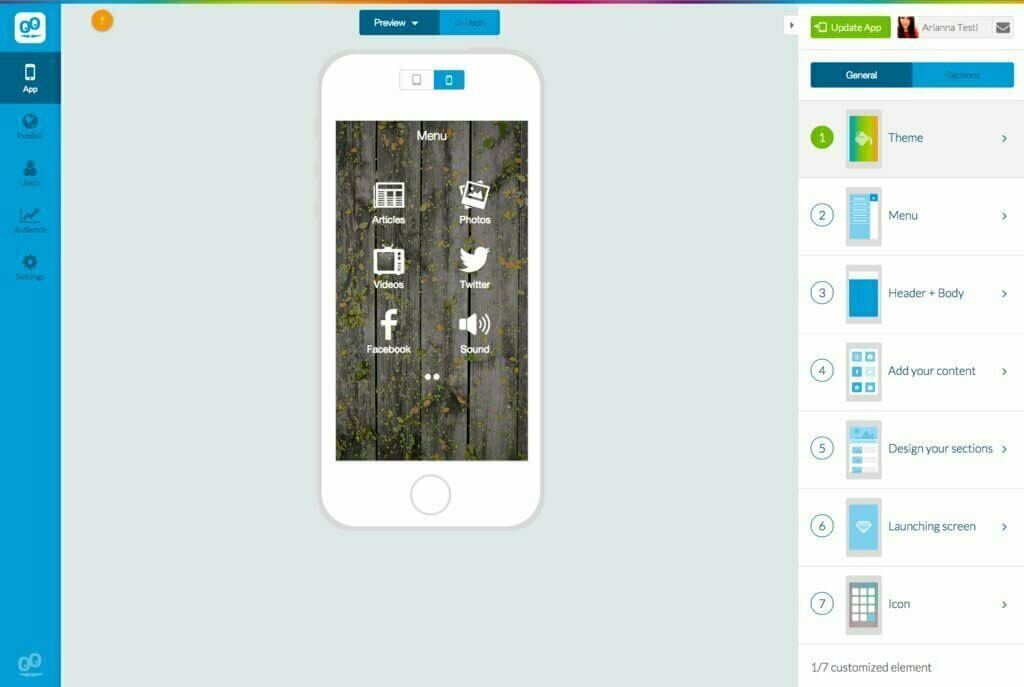
- In terms of functionality, there is really only one downside to GoodBarber and that’s its lack of online store, although it does allow app makers to integrate 3rd party stores such as Amazon for E-commerce purposes
- GoodBarber allows you to build a Native android app plus a Progressive Web App for your brand for $32/month
- Although if you’re looking for an app that works on both Android and iOS, this price shoots up to $96/month
How to Choose between DIY and Custom App Development?

1. Budget
- Most businesses that go with DIY builders do so because of a lack of capital
- While it is true that DIY platforms are much cheaper, one has to understand why that is so
- These platforms can face severe back-end functionality problems due to standard coding that isn’t optimized for high-functioning mobile apps
- If budget is a constraint that you can’ overcome, then DIY app builders might be a good option but if you can invest in getting a custom mobile app developed, then that is a better option since it is almost always great value for money
- Custom apps are more expensive but provide superior functionality, customization, and security that can be optimized to better suit your industry and your target audience for augmented profits
- One
2. Growth
- In terms of growth, DIY app builders are functionally limited if you’re looking to scale your business, and consequently
- From a growth perspective, custom mobile apps are better suited for brands that are dealing with a lot of active users or aim to target a large market
- Custom apps are much better
- The reason being a low-bug rate, easier fixing, security, and handling the load of a large number of active users
- Moreover, apps tend to get outdated with new technological advancement
- As long as your app builder does not accommodate those, you’re more likely to be left behind
- With custom mobile app development, you can always integrate these technologies into your app to always out-perform your competitors
- With custom mobile app development, you can always integrate these technologies into your app to always out-perform your competitors
- Therefore. you have to weigh the pros and cons of creating a more pocket-friendly app vs. a more expensive one
- But an expensive superior mobile app will work wonders for you even in the future
How Much Money Can An App Make In 2023?

image source: giphy.com
All mobile apps are made with an ROI target in mind. One factor that you have to consider when projecting your ROI is how much money can an app make. Also, how much of a difference will you face in generating these ROI figures. This should be thought in regard to when you opt for DIY app makers as compared to opting for custom app development. Most mobile apps that are successful across a variety of industries. The industries such as healthcare, games, real-estate and most of these apps are custom built.
This is where the argument turns against using DIY app makers. In the long-run, custom apps are more capable of providing genuine value to your consumers. These apps also help in staying up-to-date with the latest trends in mobile app development. For businesses, generating revenue through mobile apps is vital. Custom apps are far better at converting traffic into revenue, as opposed to DIY platforms. This is because custom apps are more personalized, provide better functionality, and are more optimized. Thus, they provide a great user experience.
Wrapped Up
As an entrepreneur, you have to make a decision based on what’s more important to you. If you decide to cut down on expenditure, then DIY app makers can help you build a mobile application. In the long-term business, its scalability, and the overall user experience of an app plays the most vital role. At Echoinnovate IT we can help you with your custom mobile app development. Contact Us! Today.
FAQs
What are DIY app makers?
DIY app makers are platforms that let users build apps without coding, using drag-and-drop tools.
Why are DIY apps not recommended for serious businesses?
They lack flexibility, scalability, and often cannot handle complex features or custom integrations.
Are DIY apps secure?
Many DIY platforms have limited security options, making them more vulnerable to data breaches.
Can you customize your app fully with DIY builders?
No, most offer limited templates and restrict advanced customization and UI/UX control.



